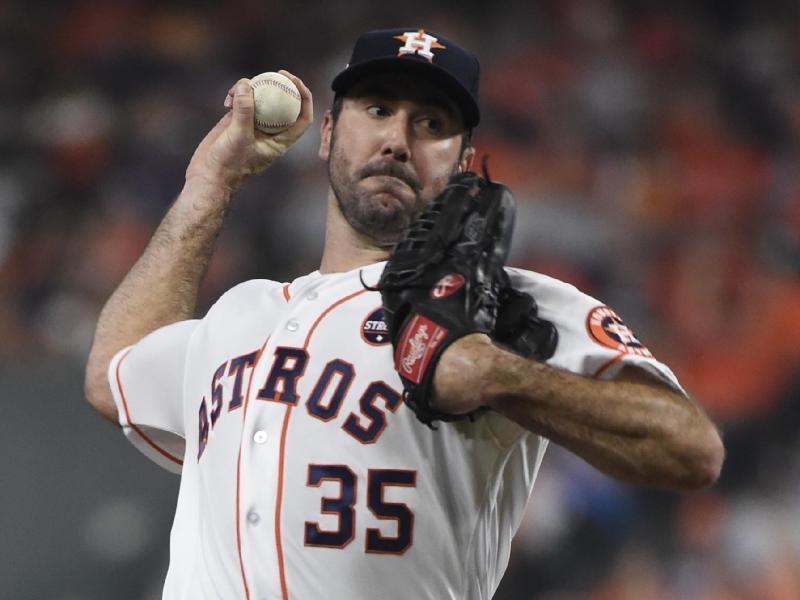Verlander: MLB juicing balls for more offense



CLEVELAND -- American League All-Star Game starter Justin Verlander told ESPN on Monday that the balls used in Major League Baseball games this season are "a f---ing joke" and that he believes "100 percent" that the league has implemented juiced balls to increase offense.
Verlander, 36, has allowed a major league-high 26 home runs this season. Overall, players hit 3,691 home runs in the season's first half and are on pace to hit 6,668 home runs, which would obliterate the record 6,105 hit in 2017.
Conversations about a juiced ball have percolated since after the All-Star break in 2015, after which home runs spiked. They are up nearly 60% from the 2014 season, and MLB commissioner Rob Manfred commissioned a study to investigate whether the balls were contributing to the home run spike. It concluded the balls were performing differently but didn't attribute a reason. In June 2018, one month after the study was released, MLB bought Rawlings, the supplier of the official major league ball.
"It's a f---ing joke," said Verlander, an eight-time All-Star who is starting his second All-Star Game on Tuesday. "Major League Baseball's turning this game into a joke. They own Rawlings, and you've got Manfred up here saying it might be the way they center the pill. They own the f---ing company. If any other $40 billion company bought out a $400 million company and the product changed dramatically, it's not a guess as to what happened. We all know what happened. Manfred the first time he came in, what'd he say? He said we want more offense. All of a sudden he comes in, the balls are juiced? It's not coincidence. We're not idiots."
Asked if he believed the balls were intentionally juiced by the league, Verlander said: "Yes. 100 percent. They've been using juiced balls in the Home Run Derby forever. They know how to do it. It's not coincidence. I find it really hard to believe that Major League Baseball owns Rawlings and just coincidentally the balls become juiced."
Manfred, who became commissioner in 2015, acknowledged Monday on ESPN's Golic and Wingo the difference in the balls. He has denied any involvement from the league in changing the composition of the ball.
"We think what's been going on this year is attributable to the baseball," Manfred told Golic and Wingo. "Our scientists that have been now studying the baseball more regularly have told us that this year the baseball has a little less drag. It doesn't need to change very much in order to produce meaningful change in terms of the way the game is played on the field. We are trying to understand exactly why that happened and build out a manufacturing process that gives us a little more control over what's going on. But you have to remember that our baseball is a handmade product and there's gonna be variation year to year."
Pitchers in particular have been outspoken this season about changes in the ball, talking about the seams, the leather, the ball's size and how it feels harder. Chicago Cubs manager Joe Maddon said of the ball this weekend: "You could just have stamped Titleist on the sides of these things."
"I hate the way I feel out there," Verlander told ESPN. "No matter who's the batter, I feel like I'm constantly walking a tightrope, because any batter can go opposite field. Any batter can leave with any pitch that's anywhere in the zone. You can't miss barrels anymore. You have to miss bats. There's been multiple times this year where five years ago I'd probably just throw a fastball away. I can't do that. Because you're the 8-, 9-hole hitter and you still can hit an opposite-field homer."
Fellow AL All-Star J.D. Martinez believes a change in hitters' approaches is to credit for the home run surge. As fastball velocity from pitchers grew, he said, their control over pitches waned, and the explosion in knowledge from hitters tilted the game in their favor.
"It's a power-arm league," Martinez said. "It's either a walk or a strikeout -- stuff over command. I think you see a lot more mistakes over the plate. The velocity, the guys trying to hit the ball in the air -- I think it's a recipe for home runs."
The juiced-ball debate within the games is often bifurcated between the pitchers lamenting the home run rise and the hitters benefiting from it. Toronto Blue Jays pitcher Marcus Stroman did not want to say explicitly the ball is different but made it clear he echoed the sentiment of his pitching peers.
"I agree with some of JV's takes, CC Sabathia 's," Stroman said. "I'll agree with those guys, retweet whatever they decide to put out.
"It's clear," Stroman continued. "I've just come to terms with it. It is what it is. You can't control it. So why even think about it?"
For Verlander, it's a matter not only of how the baseball has affected him personally -- he showed off a blister on his thumb that he said only happened in 2017 and 2019, the two seasons in which the balls were in question -- but what it means for baseball writ large.
"I don't know if it's bad or good for the game," he said. "That's for them to decide. I don't think it's great -- that the true outcomes of strikeouts, homers and walks is best for the game. That's for somebody else to decide. I talk about time a lot -- how do you stack up in history? If you're going to change something so dramatically, I think you need to make people aware."

-
Jeff Passan ESPN
 Article is LOCKED by author/seeder
Article is LOCKED by author/seeder


I think Verlander is 100% right on the juiced ball and beyond that, everything MLB has done to increase attendance has hurt the game.
BTW Verlander will start for the American League in tonight's All-Star game. You can catch it at 7:30 PM EST on FOX.
PS:
The game will be played in Cleveland. How many know that Cleveland has hosted more All-Star games than any other city?
That's my boy JV.
I'm guessing he's spot on as well. If they are juicing the balls up they should just say so. A lot of people would not have a problem with it.
Excluding ALL major league pitchers of course .....
It's probably some combination of things. I've heard the bit about the ball, but the change they're talking about seems pretty minor. I think it probably has more to do with the revolutionary change in approach we see from batters at the plate. The math heads have figured out that you get a better return on your effort if you try to hit the ball out rather than just make contact and manufacture runs.
This means that singles are down, but walks, strikeouts, and home runs are all up. Batting averages are down. It's an all-or-nothing approach with all-or-nothing results. If it were all about the ball, all hits would be up, but they're not. 20 years ago, a handful of juiced batters were hitting monster bombs, but now, you've got more 10 and 20 per year home run hitters than ever. The result is that overall homers are up. That's because everyone in the lineup is trying to hit the ball over the wall in every situation.